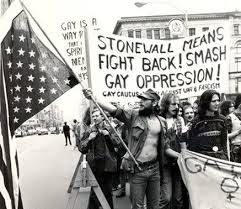 Mark Segal, the publisher of Philadelphia Gay News has written a valuable op-ed for The Advocate that I encourage everyone to read. Mark makes a number of great points which I’ll summarize below, but in my opinion, he misses something crucial about the recent controversy, and I’ll speak to that towards the end of my post.
Mark Segal, the publisher of Philadelphia Gay News has written a valuable op-ed for The Advocate that I encourage everyone to read. Mark makes a number of great points which I’ll summarize below, but in my opinion, he misses something crucial about the recent controversy, and I’ll speak to that towards the end of my post.
Those speaking for and against the boycott so far weren’t there.
Mark adds valuable first-person information as someone who was in New York and an activist at that time.
Even people who were there debate what did and didn’t happen.
This is, I believe one of the most useful points he makes. Each of us carry our memories which are based on our own experiences. Rather than debate what did or didn’t happen, or who did what, we may serve the entire community better if we listened to the various accounts and allowed the whole of it to be our History.
A number of groups were active including the” Transvestite Action Revolutionaries, the first trans organization in America.”
Mark sees the primary basis of the call for boycott to be that Trans* activists worry that Trans* involvement will either be left out or minimized. This may be so, but I think there is an important addition to this he misses. More on it later in the post.
One of my favorite passages from his op-ed:
How radical were we? Harvey Milk was living in New York City at the time and he stayed clear of us. So we in GLF — youth, trans, people of all political spectrums — had a bond. We debated everything, including our identity, which meant a clear discussion of racism and sexism. The only exception was our mutual goal of creating a community. Which means that, even though at times our debate resulted in shouting matches, we still had a special bond.
I came out in 1975/76, and was active in the birth of the Ohio Gay Rights Coalition, which later became the Ohio Gay and Lesbian Rights Coalition. I remember our long, thoughtful and sometimes tension-filled meetings as we worked for the common good. The bond that comes from intentional engagement is powerful.
Here’s my one criticism of the op-ed. The tag line reads:
Roland Emmerich’s Stonewall film may or may not follow history to a T, but it’s important to remember it’s entertainment, says longtime activist and gay publisher Mark Segal.
Indeed, it may be entertainment, but hundreds or thousands of LBTGQ persons including youth of today and generations to come will view it as History. They will watch, believing ‘this is our History,’ and therefor, it is crucial that the film be as authentic and accurate as it can be. LGBTQI persons have been so starved for knowledge of our History that any account, even a highly fictionalized one, will be understood and consumed as fact. So, the story told matters. The way it is told matters, and the characters used to tell the story matter.
The more I’ve read and learned about the boycott effort, the less inclined I am to support it. A boycott doesn’t help create a better, or more authentic story. What we really need is for the director and screen writer to assure everyone that the film will not gloss over important aspects of the real historic events. What we really need is for the director and screen writer to assure everyone that the film won’t create a false narrative that idolizes gay white male involvement in ways that may not be fair.
What we really need is for the director and screen writer to be in open dialogue with people who were there as much as possible as well as those who fear being erased. That will help make the best possible film, and bring the History into the community in the best way possible.
Reading Mark’s comments prompts my own memories of our first rally at the Ohio State Capital. I remember it vividly, and then at the same time, I wonder how accurately I do remember it. Our LGBTQI History is crucial and important.
One last point-
Even if the movie were 100% perfectly aligned to the history of what happened at Stonewall, there will be some for whom, it isn’t perfect enough, and this point is worth remembering. I don’t mean that as criticism of any one or any group who may fault the film. Queer persons have had so little of their stories told and so often been erased from History, that it is inevitable– one movie cannot replace all that has been made invisible in the past.
Regardless of how this film captures History, let’s hope we will see other films and more media that display even more LGBTQI characters, because in the end, that is what is needed.